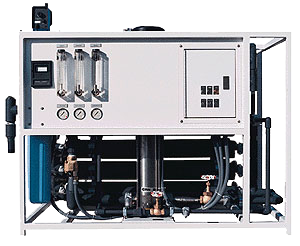Will Reverse Osmosis Membranes Remove Odor from Well Water?


A homeowner asked us if their new whole-house reverse osmosis system should be removing odors from their well water. This commercial system had no carbon filters, just pre-filters and the RO system (not supplied by us).
Many homeowners use under-sink reverse osmosis systems, which have carbon filters as part of the system, and those filters remove odor. It may be misleading for some to think that the RO membrane is removing the odors, but the carbon filter is causing the odor.
If an odor exists, you should remove it before installing under-sink or whole-house RO systems. This helps ensure the best results and prevents fouling caused by osmotic pressure and the natural flow of gases through the membrane.
Although H₂S can pass through the membrane as a gas and be removed afterward, it’s best to eliminate it before the RO system.
Often, the odor is a result of a dissolved gas, and gasses pass through the RO membrane.If untreated, hydrogen sulfide odors in well water can cause slime and buildup on RO membranes, especially when hydrogen sulfide oxidizes or sulfur bacteria are present.
RO systems can remove odors if they include an oxidation filter, carbon filter, aeration, or another component that can remove odor. RO membranes do not remove odor by themselves.
We recommended to this customer that they add a Duke Aeration System to remove the sulfur odors prior to the system and this solved the problem.
Introduction
Reverse osmosis (RO) is a water purification process that uses a semipermeable membrane to remove impurities from water. It is a popular method for producing clean drinking water and is widely used in various industries, including residential, commercial, and industrial applications. This article will provide an overview of the reverse osmosis process, its components, and how it works.
Recent Posts
Water Quality for Horses and Livestock: A Guide to Healthier Barns and Pastures
Clean water is the cornerstone of animal health and productivity. Whether you're raising horses, cattle,…
Clean Drinking Water for Cats: What Every Cat Owner Should Know
Why Clean Drinking Water Matters for Cats Hydration is critical to a cat’s overall health,…
Pet Hydration: What to Know About Water Safety
Clean Drinking Water for Dogs: What Every Dog Owner Should Know Clean drinking water is…
How to Ensure Fresh, Safe Water for Your Birds: Daily Care Tips for Bird Owners
Why Filtered Water for Birds Is Essential for Their Health Like food, clean drinking water…
U.S. Water Problems by Region: Common Contaminants & Solutions
Curious about U.S. water problems by region? Water quality isn’t just a national issue—it’s a…
Wildfire Water Contamination: How to Ensure Safe Water After a Fire
Wildfire Water Contamination: What You Need to Know After the Fires Drinking water contamination is…

